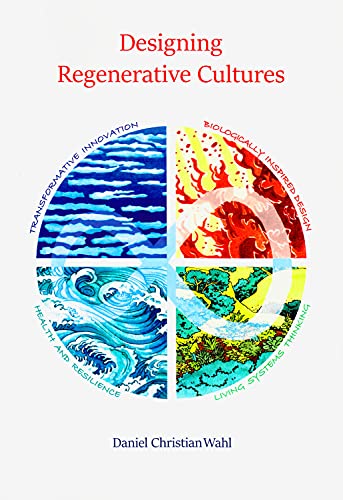Designing Regenerative Cultures
Daniel Christian Wahl
BOOK REVIEW

The yearning for a world that sustains itself rather than depletes its resources reverberates through every page of Designing Regenerative Cultures by Daniel Christian Wahl. This isn't just a book; it's a clarion call, an urgent manifesto demanding our attention in a time when humanity grapples with existential threats and ecological despair. If you've ever felt a flicker of hope amid the chaos or a burning frustration with the state of the world, this book will spark both elation and introspection.
Wahl's offering is profoundly insightful, weaving together principles of systems thinking, ecology, and inner transformation into a tapestry of possibilities for a future resplendent with sustainability. With audacious clarity, he articulates a vision that transcends traditional models of development, revealing a path that honors life and respects the fragility of our planet. The narrative converges around the idea that the cultures we design must regenerate not only the resources we draw from the Earth but also the very fabric of our communities and societies.
As you delve into this contemplative journey, each chapter invites you to confront the reality of our collective choices-the unsustainable practices that have brought us to the brink of environmental collapse. Yet, Wahl is not merely a harbinger of doom. He infuses the text with hope and actionable insights that empower you to believe in a viable alternative. The encouragement to think critically about our socio-economic systems and to embrace regenerative processes resonates profoundly, evoking an emotional upheaval within.
Readers have taken to this work with fervor, as evidenced by a spectrum of reactions that encompass admiration and challenge. Critics of Wahl's approach argue it is all too idealistic, too disconnected from the grim realities many face daily. Yet, those who embrace his vision find themselves galvanized, motivated to reflect on how they can contribute to creating a regenerative culture in their own spheres of influence. This dichotomy of response underscores the book's potency-its ability to provoke thought, igniting a fire of discussion about the paths forward.
The socio-economic context within which Wahl writes is crucial. As the world deals with the fallout of climate change, pollution, and societal inequities, his arguments serve as both a warning and a beacon. From the ruins of past mistakes rises the imperative to foster a culture that not only thrives but also heals. Wahl's passion is contagious; it beckons you to consider how your small choices-your lifestyle, your consumption habits, your community engagements-can culminate in monumental shifts.
Imagine a world where regenerative practices are commonplace-places where urban gardens thrive, where communities are tight-knit, and where commerce and ecology intertwine harmoniously. This isn't merely a utopian vision, but a tangible possibility, grounded in the principles Wahl articulates. The methods outlined are not complex; they call for mindfulness, collaboration, and a profound appreciation of the interconnections within our ecosystems.
Historically, as we stand at this crossroads, the echoes of past generations weigh heavily. Previous waves of thought-be it industrialism, capitalism without conscience, or the blind pursuit of growth-serve as cautionary tales. Wahl's clarity in navigating these issues helps illuminate a future that learns from these lessons rather than replicates them. The parallels to the rise of regenerative agriculture, sustainable architecture, and community-led initiatives are stark and inspiring.
Wahl intentionally blends personal anecdotes with rigorous research, making Designing Regenerative Cultures not just an academic endeavor but a heartfelt exploration. This unique blend makes it accessible to anyone, whether you're a seasoned environmentalist or someone simply curious about the state of our planet. His insights resonate long after the cover is closed; they linger, urging you to become an agent of change.
Moreover, the urgency of the message-intertwined with an alluring hope-challenges the reader not just to think differently but to act. The world needs more than just thinkers; it requires doers, visionaries, and rebels who dare to dream of what might be possible.
Post-reading, it's not enough to simply nod in agreement; the book demands engagement. As you process Wahl's ideas, you may find yourself pondering how to affect change in your environment, how to initiate discussions in your circles, and how to embody the very principles he espouses. Whether your heart races with excitement or tightens with fear, one thing is clear: ignoring this call to action is not an option.
In the end, Designing Regenerative Cultures is a treasure trove of inspiration, wisdom, and actionable strategies that challenges the status quo while providing a vibrant roadmap toward a flourishing future. The question that remains is not if we can regenerate our cultures, but how rapidly we can ignite the spark that turns this vision into reality. 🌍✨️ Are you ready to be part of this revolution?
📖 Designing Regenerative Cultures
✍ by Daniel Christian Wahl
🧾 288 pages
2016
#designing #regenerative #cultures #daniel #christian #wahl #DanielChristianWahl